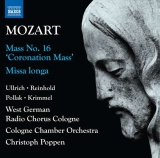Naxos beginnt eine Gesamteinspielung aller Mozart-Messen mit einer weniger bekannten Messe, der Missa longa (so bezeichnet von Leopold) Mozart, und einer seiner bekanntesten, der Krönungsmesse.
Die Messe KV 262 des 19-jährigen Wolfgang Amadeus Mozart ist nicht nur lang (31 Minuten dauert sie in dieser Aufnahme), sie ist auch (mit auffallend großer Besetzung) besonders feierlich, sie ist eine Missa solemnis komponiert für ein kirchliches Hochfest oder einen besonderen liturgischen Anlass. Genaueres dazu hat auch der erst 1980 wiedergefundene Autograph nicht ergeben.
Die Krönungsmesse wurde 1779, also vier Jahre nach der Missa longa komponiert. Sie sollte zur bevorzugten Komposition für Gottesdienste bei Kaiser- und Königskrönungen sowie bei Dankgottesdiensten werden.
Christoph Poppen dirigiert beide Messen mit viel musikantischer Frische und dynamischer Rhythmik. Er konzentriert sich auf den Text, bringt ihn auf den Punkt und lässt alle unnötigen Ausschmückungen weg. Er hat die Bedeutung der Worte sehr gut studiert und lässt uns verstehen, wie Mozart auf die liturgischen Texte reagiert hat. Es geht ihm nicht vorrangig um Klangrecherche, nicht um historische Grammatik, sondern einen möglichst natürlichen Fluss der Musik, um ausgewogene Tempi, einen homogenen Klang, eine gute Balance und eine insgesamt hohe Spielkultur. Er produziert nicht eine Ansicht, eifert nicht einer Idee nach, sondern realisiert die Musik in ihrer liturgischen Funktion.
Das Kölner Kammerorchester, dessen Chefdirigent Poppen ja ist, spielt mit großer Beweglichkeit, federnd und sehr farbig. Der exzellente WDR Rundfunkchor und das Solistenquartett, das sich nahtlos in das Ganz einfügt und nie heraussticht, geben den Interpretationen den letzten Schliff.
Naxos begins a complete recording of all Mozart masses with a lesser-known mass, the Missa longa (so designated by Leopold) Mozart, and one of his best-known, the Coronation Mass.
The Mass K. 262 by the 19-year-old Wolfgang Amadeus Mozart is not only long (it lasts 31 minutes in this recording), it is also particularly solemn (with a large instrumentation. Therefore it is also called Missa solemnis and was undoubtedly composed for an ecclesiastical high festival or special liturgical occasion. Even the autograph, which was only rediscovered in 1980, has not yielded any more precise information.
The Coronation Mass was composed in 1779, four years after the Missa longa. It was to become the preferred composition for services at imperial and royal coronations as well as for thanksgiving services.
Christoph Poppen conducts both masses with much musical freshness and dynamic rhythm. He concentrates on the text, brings it to the point and leaves out all unnecessary embellishments. He has studied the meaning of the words very well and lets us understand how Mozart reacted to the liturgical texts. He is not overly concerned with sound research, not with historical grammar, but with the most natural flow of music possible, with balanced tempi, a homogeneous sound, a good balance and an overall high level of playing. He does not produce a view, does not emulate an idea, but realizes the music in its liturgical function.
The Cologne Chamber Orchestra, of which Poppen is the principal conductor, plays with great agility, bouncy and very colorful. The excellent WDR Rundfunkchor and the quartet of soloists, who fit seamlessly into the whole and never stand out, put the finishing touches on the interpretations.






















